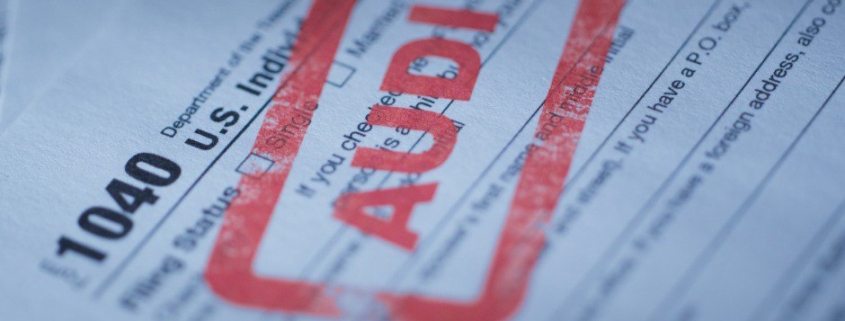Got a Letter From the IRS? Don’t Panic – Learn About CP-Series Notices!
- Learn about CP-series notices.
- Find information regarding common automated notices.
- Frequent errors and ID theft happen.
- You may receive a notice about penalties and interest due.
- Find out what you should do if you receive one of these notices.
- Learn what your Fiducial representative will do when you contact them.
Now that most tax refunds are deposited directly into taxpayers’ bank accounts, the dream of opening your mailbox and finding an IRS refund check is all but a thing of the past. However, since the IRS now does most of its auditing through correspondence, an IRS letter can likely increase your heart rate and, in some cases, even ruin your day. That’s why you need to know about CP-series notices and what they mean.

CP-Series Notices
When the IRS thinks it detects a potential issue with your tax return, it will contact you via U.S. mail; this is done through CP-series notices. Please note that the IRS’s first contact about tax delinquency or discrepancy will never be a phone call or email. Such calls and emails are a common tool for scammers; if you get one, simply hang up the phone or delete the email. If you are concerned about the validity of a given message, please call your Fiducial representative.
Most commonly, CP-series notices describe the proposed changes affecting the return, the proposed tax due (or refund), as well as any interest or penalties. The notice will also explain the examination process and describe how you can respond.
These automated notices are sent out year-round, and they are quite common. As the IRS tries to close the tax revenue gap, it has become more aggressive in its collection efforts. In addition, as many taxpayers now use low-quality tax mills or do-it-yourself software, the number of notices sent because of preparer errors has increased. Missed checkboxes, misunderstandings of available credits, and overlooked income all add up to more errors.
The first step the IRS uses in this automated process involves matching what you reported on your tax return to the data that third parties (e.g., employers, banks, and brokers) reported. When this information does not agree, the automated collection effort begins.
Don’t Panic
These notices often include errors. However, you do need to respond before the deadline specified on the notice (usually 30 days) or else face significant repercussions. The notice may even be related to suspected ID theft. For instance, someone may have gained access to your tax ID (or that of your spouse or one of your dependents) and tried to file a return using the stolen ID. The first step is to determine which type of notice you have received.
The IRS currently has over 150 varieties of CP notices. The following is a very small sampling of these notices. The IRS provides an online search tool that provides information on all of the CP Notices.
CP-Series Notices to Note
CP01C
The CP01C notice advises taxpayers that the IRS marked their account with an identity theft indicator and provides additional information and resources for identity protection.
CP05A
If you received this notice, the IRS is examining your tax return and needs you to send verifying documents.
CP05B
If you received this notice, the IRS is holding your refund because the income reported on your tax return may not match the income reported to the IRS by payers.
CP12
This notice tells you that the IRS corrected one or more mistakes on your tax return and that the original overpayment amount has changed.
CP14
If you received this notice, you owe money on unpaid taxes. Pay the amount you owe, establish a payment plan, or call if you disagree with the amount.
CP27
You received this notice because the IRS records indicate you may be eligible for the Earned Income Credit (EIC), but didn't claim it on your tax return.
CP49
If you received this notice, the IRS used all or part of your refund to pay a tax debt.
CP54E
Informs you that your tax return shows a different name and/or ID number from the information the IRS has for your account. Please provide the requested information.
CP59
If you received this Notice, the IRS has no record of you filing your prior personal tax return(s). The Spanish version of this notice is CP759.
CP81
It tells you the IRS hasn’t received your tax return for a specific tax year. The statute of limitations to claim a refund of your credits or payments (such as income tax that was withheld) for that tax year is about to expire.
CP112
This notice tells you the IRS made changes to your return because they believe there’s a miscalculation. As a result, you are due a refund.
CP161
If you received this notice, you have an unpaid balance due.
CP237
Tells you the IRS sent you a replacement refund check.
CP237A
Tells you to call the IRS to request your refund check.
CP240
If you received this notice, there's a discrepancy between the information you reported and the employer reports, and figures submitted to the IRS from your W-2, W-2G, and 1099-R forms. As a result of this discrepancy, you owe an additional amount.
CP501
If you received this notice, you have a balance due on one of your tax accounts.
CP516
This notice informs you that the IRS still has no record that you filed your prior tax return or returns.
CP518
The CP518 Business Notice is a final reminder that the IRS has no record that you filed your prior business tax returns. The Spanish version of this notice is CP618.
CP521
If you received a CP521, CP521 (SP), or CP621 Notice, the IRS is reminding you that you have an installment payment due. Send your payment immediately.
CP523
If you received a CP523, CP523 (SP), or CP623 Notice, the IRS is informing you of the intent to terminate your installment agreement and seize (levy) your assets. You have defaulted on your agreement.
CP2000
A CP2000 notice is very different from the other CP notices (which deal with issues such as identity theft, audits, and earned income credit). The CP2000 notice includes proposed—almost always unfavorable (as it almost always asserts unreported income)—changes to your tax return, and it allows you to dispute the proposed change. Procrastinating or ignoring this notice will only cause the IRS to ratchet up its collection efforts, which in turn will make it more difficult for you to dispute the proposed adjustment.
Sometimes, the IRS will be correct. You may have overlooked a capital gain or income from a second job. It is also possible that the IRS has caught someone else using your SSN to work or otherwise stealing your identity. Quite frequently, however, the IRS is incorrect, simply because its software isn’t sophisticated enough to pick up all the information that you report on the schedules attached to your return.
These notices of proposed change will also include penalties and interest. Even if you do owe the tax, your Fiducial representative may be able to get the penalties abated for due cause.
When you receive an IRS notice, your first step should be to immediately contact your Fiducial representative and provide them with a copy of the notice. If you are a current client, they will review the notice to determine whether it is correct, and then consult with you to determine how best to respond. For others, Fiducial may need a copy of the tax return on which the notice is based before being able to help.
Call Fiducial at 1-866-FIDUCIAL or make an appointment at one of our office locations to discuss your situation.
Ready to book an appointment now? Click here. Know someone who might need our services? We love referrals!









